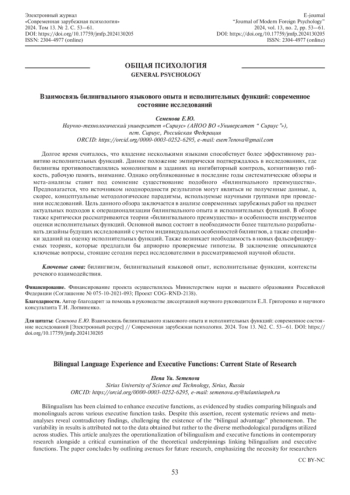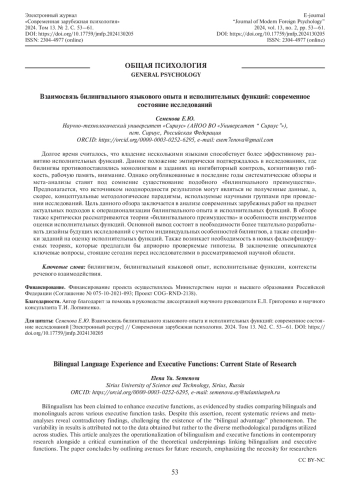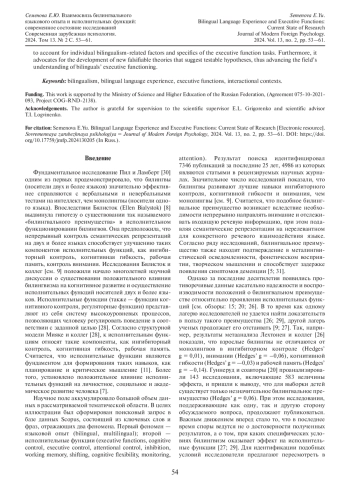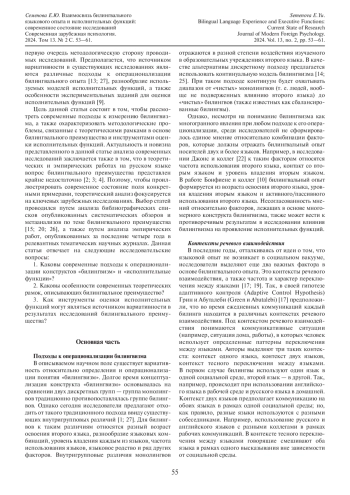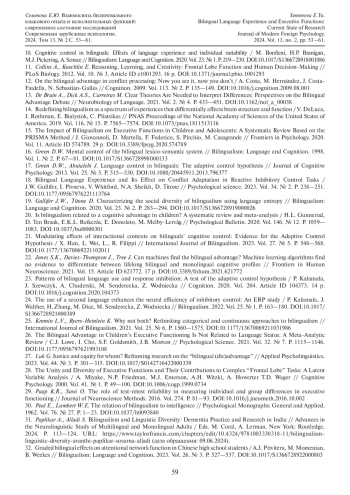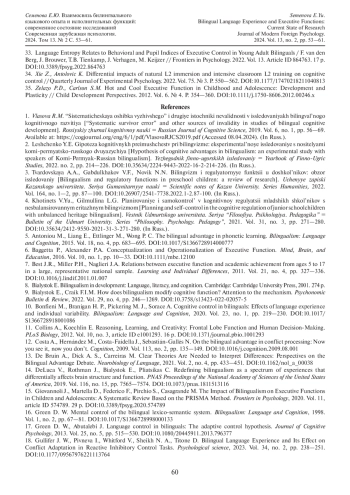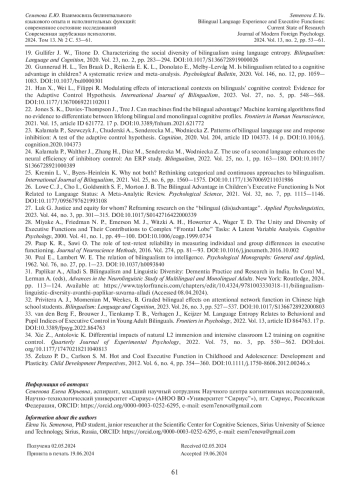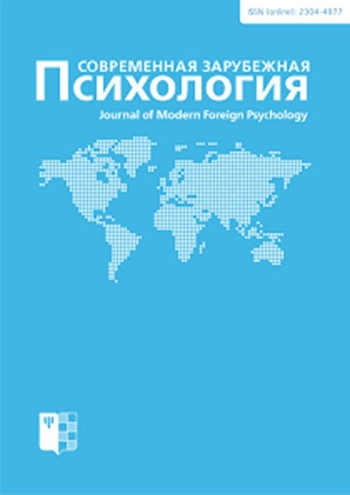1. Власова Р.М. “Систематическая ошибка выжившего” и другие источники невалидности в исследованиях билингвального когнитивного развития // Российский журнал когнитивной науки. 2019. Том 6. № 1. С. 56-69. URL: https://cogjournal.org/eng/6/1/pdf/VlasovaRJCS2019.pdf (дата обращения: 09.06.2024). EDN: WBVLRB
2. Лещенко Ю.Е. Гипотеза когнитивных преимуществ при билингвизме: экспериментальное исследование с носителями коми-пермяцко-русского двуязычия // Ежегодник финно-угорских исследований. 2022. № 2. С. 214-226. DOI: 10.35634/2224-9443-2022-16-2-214-226 EDN: NAZCEU
3. Твардовская А.А., Габдулхаков В.Ф., Новик Н.Н. Билингвизм и регуляторные функции у дошкольников: обзор исследований // Ученые записки Казанского университета. Серия “Гуманитарные науки”. 2022. Том 164. № 1-2. С. 87-100. DOI: 10.26907/2541-7738.2022.1-2.87-100 EDN: DFPEGR
4. Хотинец В.Ю., Гильмуллина Л.Г. Планирование и самоконтроль в когнитивной регуляции младших школьников с несбалансированным эритажным билингвизмом // Вестник Удмуртского университета. Серия “Философия. Психология. Педагогика”. 2021. Том 31. № 3. С. 27-280. DOI: 10.35634/2412-9550-2021-31-3-271-280 EDN: YAEMEJ
5. The bilingual advantage in phonetic learning / M. Antoniou, E. Liang, M. Ettlinger, P.C. Wong // Bilingualism: Language and Cognition. 2015. Vol. 18. № 4. P. 683-695. DOI: 10.1017/S1366728914000777
6. Baggetta P., Alexander P.A. Conceptualization and Operationalization of Executive Function // Mind, Brain, and Education. 2016. Vol. 10. № 1. P. 10-33. DOI: 10.1111/mbe.12100
7. Best J.R., Miller P.H., Naglieri J.A. Relations between executive function and academic achievement from ages 5 to 17 in a large, representative national sample // Learning and Individual Differences. 2011. Vol. 21. № 4. P. 327-336. DOI: 10.1016/j.lindif.2011.01.007
8. Bialystok E. Bilingualism in development: Language, literacy, and cognition. Cambridge: Cambridge University Press, 2001. 274 p.
9. Bialystok E., Craik F.I.M. How does bilingualism modify cognitive function? Attention to the mechanism // Psychonomic Bulletin & Review. 2022. Vol. 29. № 4. P. 246-1269. DOI: 10.3758/s13423-022-02057-5 EDN: HBEJXN
10. Cognitive control in bilinguals: Effects of language experience and individual variability / M. Bonfieni, H.P. Branigan, M.J. Pickering, A. Sorace // Bilingualism: Language and Cognition. 2020. Vol. 23. № 1. P. 219-230. DOI: 10.1017/S1366728918001086
11. Collins A., Koechlin E. Reasoning, Learning, and Creativity: Frontal Lobe Function and Human Decision-Making // PLoS Biology. 2012. Vol. 10. № 3. Article ID e1001293. 16 p. DOI: 10.1371/journal.pbio.1001293
12. On the bilingual advantage in conflict processing: Now you see it, now you don’t / A. Costa, M. Hernández, J. Costa-Faidella, N. Sebastián-Gallés // Cognition. 2009. Vol. 113. № 2. P. 135-149. DOI: 10.1016/j.cognition.2009.08.001
13. De Bruin A., Dick A.S., Carreiras M. Clear Theories Are Needed to Interpret Differences: Perspectives on the Bilingual Advantage Debate // Neurobiology of Language. 2021. Vol. 2. № 4. P. 433-451. DOI: 10.1162/nol_a_00038 EDN: PKMAEB
14. Redefining bilingualism as a spectrum of experiences that differentially affects brain structure and function / V. DeLuca, J. Rothman, E. Bialystok, C. Pliatsikas // PNAS Proceedings of the National Academy of Sciences of the United States of America. 2019. Vol. 116. № 15. P. 7565-7574. DOI: 10.1073/pnas.1811513116
15. The Impact of Bilingualism on Executive Functions in Children and Adolescents: A Systematic Review Based on the PRISMA Method / J. Giovannoli, D. Martella, F. Federico, S. Pirchio, M. Casagrande // Frontiers in Psychology. 2020. Vol. 11. Article ID 574789. 29 p. DOI: 10.3389/fpsyg.2020.574789 EDN: WBVHWE
16. Green D.W. Mental control of the bilingual lexico-semantic system // Bilingualism: Language and Cognition. 1998. Vol. 1. № 2. P. 67-81. DOI: 10.1017/S1366728998000133 EDN: ECBEFL
17. Green D.W., Abutalebi J. Language control in bilinguals: The adaptive control hypothesis // Journal of Cognitive Psychology. 2013. Vol. 25. № 5. P. 515-530. DOI: 10.1080/20445911.2013.796377
18. Bilingual Language Experience and Its Effect on Conflict Adaptation in Reactive Inhibitory Control Tasks / J.W. Gullifer, I. Pivneva, V. Whitford, N.A. Sheikh, D. Titone // Psychological science. 2023. Vol. 34. № 2. P. 238-251. DOI: 10.1177/09567976221113764 EDN: BJVYKZ
19. Gullifer J.W., Titone D. Characterizing the social diversity of bilingualism using language entropy // Bilingualism: Language and Cognition. 2020. Vol. 23. № 2. P. 283-294. DOI: 10.1017/S1366728919000026
20. Is bilingualism related to a cognitive advantage in children? A systematic review and meta-analysis / H.L. Gunnerud, D. Ten Braak, E.K.L. Reikerås, E. Donolato, M. Melby-Lervåg // Psychological Bulletin. 2020. Vol. 146. № 12. P. 1059-1083. DOI: 10.1037/bul0000301 EDN: HSTMBY
21. Modulating effects of interactional contexts on bilinguals’ cognitive control: Evidence for the Adaptive Control Hypothesis / X. Han, L. Wei, L., R. Filippi // International Journal of Bilingualism. 2023. Vol. 27. № 5. P. 548-568. DOI: 10.1177/13670069221102011 EDN: AGJHLG
22. Jones S.K., Davies-Thompson J., Tree J. Can machines find the bilingual advantage? Machine learning algorithms find no evidence to differentiate between lifelong bilingual and monolingual cognitive profiles // Frontiers in Human Neuroscience. 2021. Vol. 15. Article ID 621772. 17 p. DOI: 10.3389/fnhum.2021.621772 EDN: KXMHUI
23. Patterns of bilingual language use and response inhibition: A test of the adaptive control hypothesis / P. Kałamała, J. Szewczyk, A. Chuderski, M. Senderecka, Z. Wodniecka // Cognition. 2020. Vol. 204. Article ID 104373. 14 p. DOI: 10.1016/j.cognition.2020.104373 EDN: HLTKNX
24. The use of a second language enhances the neural efficiency of inhibitory control: An ERP study / P. Kałamała, J. Walther, H. Zhang, M. Diaz, M. Senderecka, Z. Wodniecka // Bilingualism. 2022. Vol. 25. № 1. P. 163-180. DOI: 10.1017/S1366728921000389 EDN: DCZGGU
25. Kremin L.V., Byers-Heinlein K. Why not both? Rethinking categorical and continuous approaches to bilingualism // International Journal of Bilingualism. 2021. Vol. 25. № 6. P. 1560-1575. DOI: 10.1177/13670069211031986 EDN: GFXBZH
26. The Bilingual Advantage in Children’s Executive Functioning Is Not Related to Language Status: A Meta-Analytic Review / C.J. Lowe, I. Cho, S.F. Goldsmith, J.B. Morton // Psychological Science. 2021. Vol. 32. № 7. P. 1115-1146. DOI: 10.1177/0956797621993108 EDN: EXCKDB
27. Luk G. Justice and equity for whom? Reframing research on the “bilingual (dis)advantage” // Applied Psycholinguistics. 2023. Vol. 44. № 3. P. 301-315. DOI: 10.1017/S0142716422000339 EDN: PVTSTU
28. The Unity and Diversity of Executive Functions and Their Contributions to Complex “Frontal Lobe” Tasks: A Latent Variable Analysis / A. Miyake, N.P. Friedman, M.J. Emerson, A.H. Witzki, A. Howerter T.D. Wager // Cognitive Psychology. 2000. Vol. 41. № 1. P. 49-100. DOI: 10.1006/cogp.1999.0734 EDN: GTFMVB
29. Paap K.R., Sawi O. The role of test-retest reliability in measuring individual and group differences in executive functioning // Journal of Neuroscience Methods. 2016. Vol. 274. P. 81-93. DOI: 10.1016/j.jneumeth.2016.10.002
30. Peal E., Lambert W.E. The relation of bilingualism to intelligence // Psychological Monographs: General and Applied. 1962. Vol. 76. № 27. P. 1-23. DOI: 10.1037/h0093840
31. Paplikar A., Alladi S. Bilingualism and Linguistic Diversity: Dementia Practice and Research in India // Advances in the Neurolinguistic Study of Multilingual and Monolingual Adults / Eds. M. Coral, A. Lerman. New York: Routledge, 2024. P. 113-124. URL: https://www.taylorfrancis.com/chapters/edit//bilingualism-linguistic-diversity-avanthi-paplikar-suvarna-alladi (дата обращения: 09.06.2024). DOI: 10.4324/9781003330318-11
32. Graded bilingual effects on attentional network function in Chinese high school students / A.J. Privitera, M. Momenian, B. Weekes // Bilingualism: Language and Cognition. 2023. Vol. 26. № 3. P. 527-537. DOI: 10.1017/S1366728922000803 EDN: YCSQFR
33. Language Entropy Relates to Behavioral and Pupil Indices of Executive Control in Young Adult Bilinguals / F. van den Berg, J. Brouwer, T.B. Tienkamp, J. Verhagen, M. Keijzer // Frontiers in Psychology. 2022. Vol. 13. Article ID 864763. 17 p. DOI: 10.3389/fpsyg.2022.864763 EDN: VTQNJS
34. Xie Z., Antolovic K. Differential impacts of natural L2 immersion and intensive classroom L2 training on cognitive control // Quarterly Journal of Experimental Psychology. 2022. Vol. 75. № 3. P. 550-562. DOI: 10.1177/17470218211040813 EDN: SABNSC
35. Zelazo P.D., Carlson S.M. Hot and Cool Executive Function in Childhood and Adolescence: Development and Plasticity // Child Development Perspectives. 2012. Vol. 6. № 4. P. 354-360. DOI: 10.1111/j.1750-8606.2012.00246.x
